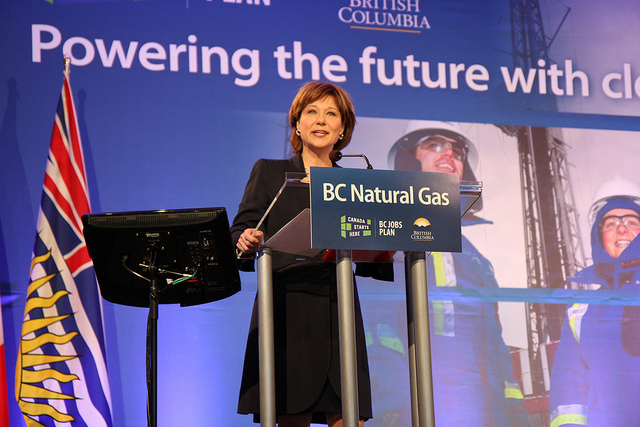This week we released a new report, Path to Prosperity? A Closer Look at British Columbia’s Natural Gas Royalties and Proposed LNG Income Tax, about liquefied natural gas (LNG ) development in B.C., and the public revenues that might be expected. So far, LNG has lacked a real public debate. On one side, we have the drumbeat of the business press with coverage of the deals in the works (which, after a couple years, have yet to come to a final investment decision by any interested party). On the other, we have what can only be called propaganda coming from the B.C. government: 100,000 jobs! $100 billion in revenues! Cleanest LNG in the world! We’ll reduce emissions in China!
These claims have been repeated ad nauseum, without anything a researcher might call evidence. The rush is on, we are told, and we have to cash in or lose our opportunity forever — sounds a lot like the Nigerian email scam. There is good reason to believe that we may be witnessing a phenomenal giveaway of a finite public resource to global corporations, and with very little coming back to us, the collective owners of that resource.
The report looks at the case for a massive revenue windfall — a $100-billion Prosperity Fund claimed in the 2013 pre-election Throne Speech. That claim got turned into a banner wrap on Premier Clark’s election tour bus for a “debt-free B.C.” and also hints at tax cuts and increase public services to boot. None of which is consistent with the idea of a true Norway-style “prosperity fund,” which would set aside public revenues and then use the annual interest revenue to pay for good things. No matter, this is more about politics than good economics.
The case for any revenue windfall hinges on high Asian prices for gas in recent years vs. low prices in North America due to the shale gas revolution. But this is not likely to last. Japan and Korea, together more than half the world market for LNG, have had nuclear downtime and are both likely to get those reactors up and running soon, which will undercut Asian demand. And lots of new LNG supply is in the works, and Asian importers are banding together to press for lower prices.
If B.C. exports cannot get top prices, corporate profits fall dramatically because it costs a lot to liquefy and ship gas to Asia. The proposed LNG income tax, tabled in Budget 2014, would raise less revenue accordingly. But it gets worse because the design of that tax allows companies to write-off all of their capital costs before the start paying the full LNG income tax (there is a pre-payment, called the Tier 1 tax, in the early years but this too is fully deductible from the full LNG income tax). This means any cost over-runs will be paid for out of reduced LNG tax revenues, a significant design flaw given the massive cost over-runs common to this industry (Australia, in particular).
The paper models revenues at different levels of output and price to develop a more plausible range of revenues, like what one might see in a budget not an election campaign. I conclude that B.C. needs to lower its expectations, and its claims, of a financial windfall.
The other point the paper makes is that there will be public costs of getting this industry off the ground. More study is needed on what those costs are, but they may exceed and public benefits B.C. receives. Basically, the B.C. government has no plan to manage the complex labour, environmental and community issues associated with an LNG boom. They are not talking to anyone besides industry, and they are not engaging the public in an honest debate about costs and benefits of development.
The danger in all of this is that the B.C. government has placed all of its bets on LNG. So much political capital has been spent, and the proponents know this, that they may settle for a bad deal rather than no deal.
Photo: BC Gov Photos/flickr



